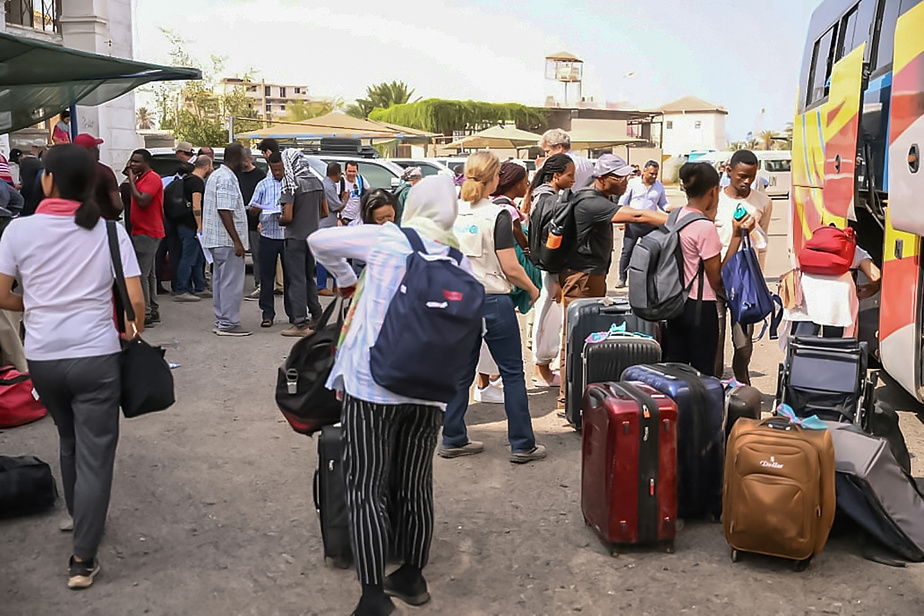(Khartoum) Many countries continued Monday to evacuate their nationals from Sudan, on the edge of the “precipice” according to the UN secretary general, after ten days of deadly fighting between the army and the paramilitaries.
Explosions, air raids and shootings have not stopped since April 15 in Khartoum, pushing thousands of inhabitants from the capital plunged into chaos to exodus. Those who cannot flee try to survive, deprived of water and electricity, subject to food shortages and internet and telephone cuts.
On Monday, the doctors’ union issued an urgent appeal: “Several districts of Khartoum are bombarded, there are dead civilians and about fifty seriously injured, all nearby doctors must go there as soon as possible”.
The fighting has already left more than 420 dead and 3,700 injured, according to the World Health Organization (WHO).
The violence in this East African country, one of the poorest in the world, risks “invading the entire region and beyond”, warned the UN Secretary General on Monday, Antonio Guterres. He again called for a ceasefire to “steer Sudan away from the precipice”.
Despite the departure of many diplomats and foreign citizens, Volker Perthes, the head of the UN mission which has been trying for four years to get the military in power to transition to democracy, announced that he would stay in Sudan.
Foreign capitals have managed to negotiate passages with the two belligerents: the army of General Abdel Fattah al-Burhane, de facto ruler of Sudan, and his deputy who became his rival, General Mohamed Hamdane Daglo, who commands the paramilitaries of the rapid support (FSR).
Over 1,000 EU nationals were evacuated. “A first group” of Chinese, several dozen South Africans and hundreds of nationals of Arab countries also left, by road, sea or air.
A Lebanese national, ready to embark for Saudi Arabia in Port-Sudan, a coastal city in the east of the country spared from the violence, tells AFP that he left with “a T-shirt and pajamas”, while what remains to him “after 17 years” in Sudan.
In Khartoum, “we were under siege, like in a thriller,” he says. “War fell upon us without warning”, and now “everything is destroyed”.
About 700 international staff from the UN, NGOs and embassies “have been evacuated to Port Sudan”, the UN said. Dozens of other aid workers were evacuated to Chad from western Darfur, the region hardest hit by fighting with Khartoum.
Most of the evacuated foreigners are diplomatic personnel, such as those from the United States and the United Kingdom. Many nationals are still waiting for a place in the long convoys of white cars or buses that leave continuously from Khartoum.
Experts and humanitarians are now worried about the fate of the Sudanese.
“I fear for their future,” admitted Norwegian Ambassador Endre Stiansen.
In a country where inflation is already in three figures in normal times, the kilo of rice or the liter of gasoline are now exchanged at gold prices.
However, fuel is the key to escape to Egypt, 1000 kilometers to the north, or to reach Port Sudan and hope to get on a boat.
“As foreigners who can flee, the impact of the violence on an already critical humanitarian situation is worsening,” warns the UN, whose agencies, like many humanitarian organizations, have suspended their activities.
Five aid workers have been killed and, according to the doctors’ union, nearly three-quarters of hospitals are out of service.
Sudanese have already fled to Egypt and South Sudan, which has 800,000 refugees in Sudan. Among them, women and children are now crossing in the other direction, according to the UN. At least 20,000 Sudanese have taken refuge in Chad, which borders Darfur.
Again on Monday, witnesses told AFP that thousands of people had headed for the Chadian border, fleeing “fighting” in el-Geneina, Darfur.
This region, the poorest in the country, was ravaged in the 2000s by a war ordered by the dictator Omar el-Bashir, who was ousted in 2019, and led in particular by the Janjawid militiamen, from which the FSR originated.
The war had been simmering for weeks between the two rival generals, who had joined forces to oust civilians from power during the 2021 putsch, then ending the democratic transition, but who failed to agree on the integration of FSR into regular troops.
US Foreign Minister Antony Blinken on Monday expressed “very serious concerns” over the presence in Sudan of the Russian mercenary group Wagner, which he said is bringing “where it is present its share of additional deaths”. and destruction”.
News reports citing officials reported weapons supplied by Wagner to the FSR.

